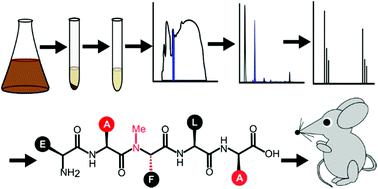当前位置:
X-MOL 学术
›
Org. Biomol. Chem.
›
论文详情
Our official English website, www.x-mol.net, welcomes your
feedback! (Note: you will need to create a separate account there.)
Development and utilization of peptide-based quorum sensing modulators in Gram-positive bacteria.
Organic & Biomolecular Chemistry ( IF 2.9 ) Pub Date : 2020-09-01 , DOI: 10.1039/d0ob01421d Dominic N McBrayer 1 , Crissey D Cameron 2 , Yftah Tal-Gan 2
Organic & Biomolecular Chemistry ( IF 2.9 ) Pub Date : 2020-09-01 , DOI: 10.1039/d0ob01421d Dominic N McBrayer 1 , Crissey D Cameron 2 , Yftah Tal-Gan 2
Affiliation

|
Quorum sensing (QS) is a mechanism by which bacteria regulate cell density-dependent group behaviors. Gram-positive bacteria generally rely on auto-inducing peptide (AIP)-based QS signaling to regulate their group behaviors. To develop synthetic modulators of these behaviors, the natural peptide needs to be identified and its structure–activity relationships (SARs) with its cognate receptor (either membrane-bound or cytosolic) need to be understood. SAR information allows for the rational design of peptides or peptide mimics with enhanced characteristics, which in turn can be utilized in studies to understand species-specific QS mechanisms and as lead scaffolds for the development of therapeutic candidates that target QS. In this review, we discuss recent work associated with the approaches used towards forwarding each of these steps in Gram-positive bacteria, with a focus on species that have received less attention.
中文翻译:

革兰氏阳性菌中基于肽的群体感应调节剂的开发和利用。
群体感应(QS)是细菌调节细胞密度依赖性群体行为的机制。革兰氏阳性细菌通常依靠基于自诱导肽(AIP)的 QS 信号来调节其群体行为。为了开发这些行为的合成调节剂,需要识别天然肽,并了解其与其同源受体(膜结合或胞质)的结构-活性关系(SAR)。 SAR 信息允许合理设计具有增强特性的肽或肽模拟物,进而可用于研究以了解物种特异性 QS 机制,并作为开发针对 QS 的候选治疗药物的主要支架。在这篇综述中,我们讨论了与在革兰氏阳性细菌中转发每个步骤的方法相关的最新工作,重点关注较少受到关注的物种。
更新日期:2020-09-30
中文翻译:

革兰氏阳性菌中基于肽的群体感应调节剂的开发和利用。
群体感应(QS)是细菌调节细胞密度依赖性群体行为的机制。革兰氏阳性细菌通常依靠基于自诱导肽(AIP)的 QS 信号来调节其群体行为。为了开发这些行为的合成调节剂,需要识别天然肽,并了解其与其同源受体(膜结合或胞质)的结构-活性关系(SAR)。 SAR 信息允许合理设计具有增强特性的肽或肽模拟物,进而可用于研究以了解物种特异性 QS 机制,并作为开发针对 QS 的候选治疗药物的主要支架。在这篇综述中,我们讨论了与在革兰氏阳性细菌中转发每个步骤的方法相关的最新工作,重点关注较少受到关注的物种。











































 京公网安备 11010802027423号
京公网安备 11010802027423号